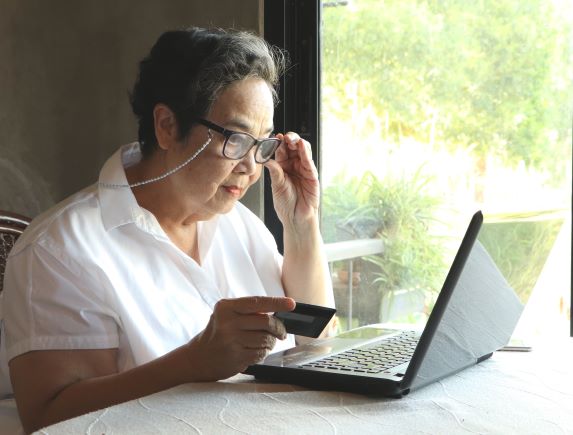Online shopping safety tips
For many, the way we shop has changed considerably in recent years. for those new to online shopping read our online shopping safety tips.
For many, the way we shop has changed considerably in recent years. Many people shop online for convenience, to save time and money. Online purchasing has also seen a big increase with the arrival of COVID-19. However, if online shopping is something that is newer to you, you should keep these safety tips in mind.
Know your seller
Use familiar websites for online purchases. Check the websites to make sure they are the official seller and not a scammer impersonating a brand. Fake sellers impersonating a brand or company may often be identified by a website ending in a .net instead of a .com.
Avoid buying items from pop-up windows or mass emails sent to you.
Check that the website address starts with ‘https’ and contains the padlock symbol (in the URL field) to ensure that it is a secure website.
Read reviews
Do your homework before making a purchase from a new website. Research and read reviews about the website and their service. Look for contact details and location details on the website, or even call the company direct to confirm legitimacy.
Use secure payment options
Secure payment options include PayPal, BPAY and credit cards. It’s not advisable to use a debit card or share personal bank details. Also check your bank statements regularly to make sure everything is legitimate and accounted for and report any suspicious transactions immediately.
Be aware of scams
Keep up to date with current scams. You can do this by checking websites such as www.scamwatch.gov.au/ that give you current information on the different scams, so you know what to look out for in advance.
Update your systems
Make sure your home computer antivirus and operating systems are up to date. This will ensure that your personal data remains protected. Consider running regular scans on your computers and devices, such as weekly or monthly. And remember it is always better to use your own devices, rather than using public ones.
Don’t give out personal information
Online shopping websites do not need all of your personal data for you to make a purchase. Make sure you don’t overshare, so things like your date of birth shouldn’t be given out.
Create strong passwords
Its recommended to regularly change your passwords and when doing this, use strong passwords. This should include a longer password that includes uppercase, lower case, letters, numbers and symbols. Here is an useful article that goes into more details about strong passwords – au.pcmag.com/password-managers/52377/simple-tricks-to-remember-insanely-secure-passwords
Log out
Always log out of websites after placing an order and keep a copy of the confirmation emails for your records.
Read the terms and conditions
Always read the purchase terms and conditions on the site that you are considering purchasing from. It is also good to also read up on their refund policy while you are at it.
Following the above tips will assist in minimising any issues with your online shopping. However if you ever think there is a problem, make sure you contact your bank immediately and report all scams that you come across to scam watch here – www.scamwatch.gov.au/report-a-scam
Otherwise happy shopping!
Sources:
www.cyber.gov.au/acsc/view-all-content/advice/shopping-or-buying-online
au.pcmag.com/shopping/59593/14-tips-for-safe-online-shopping
au.pcmag.com/password-managers/52377/simple-tricks-to-remember-insanely-secure-passwords
staysafeonline.org/stay-safe-online/online-safety-basics/online-shopping/











